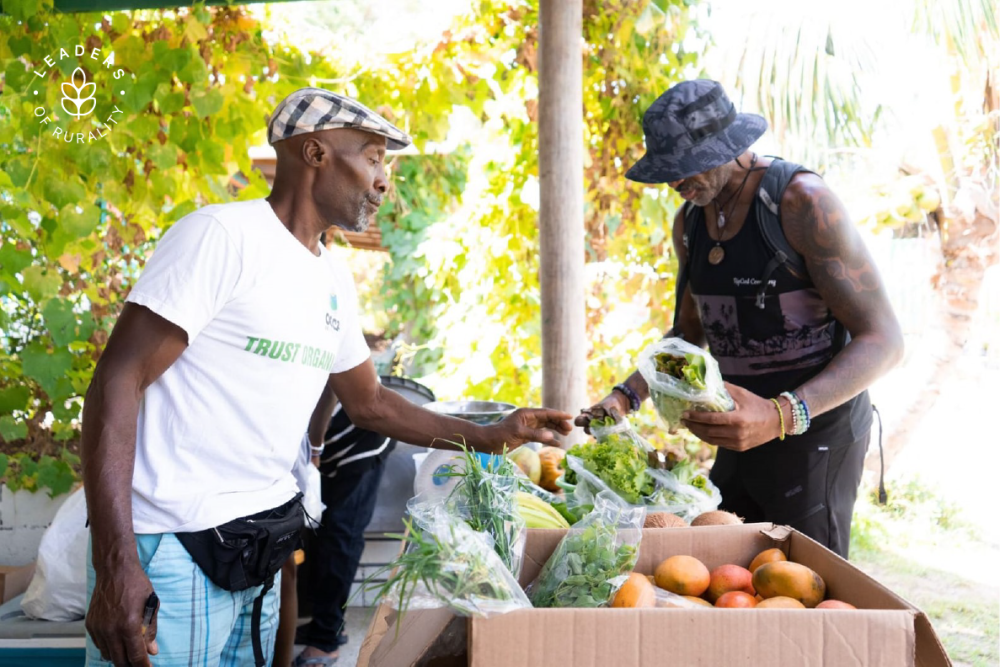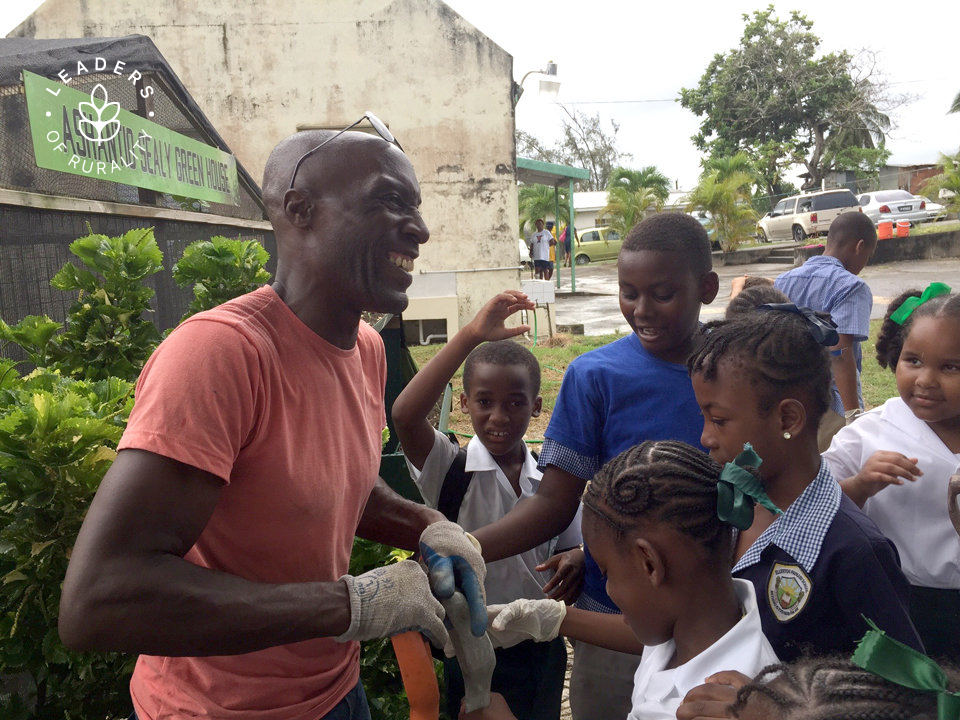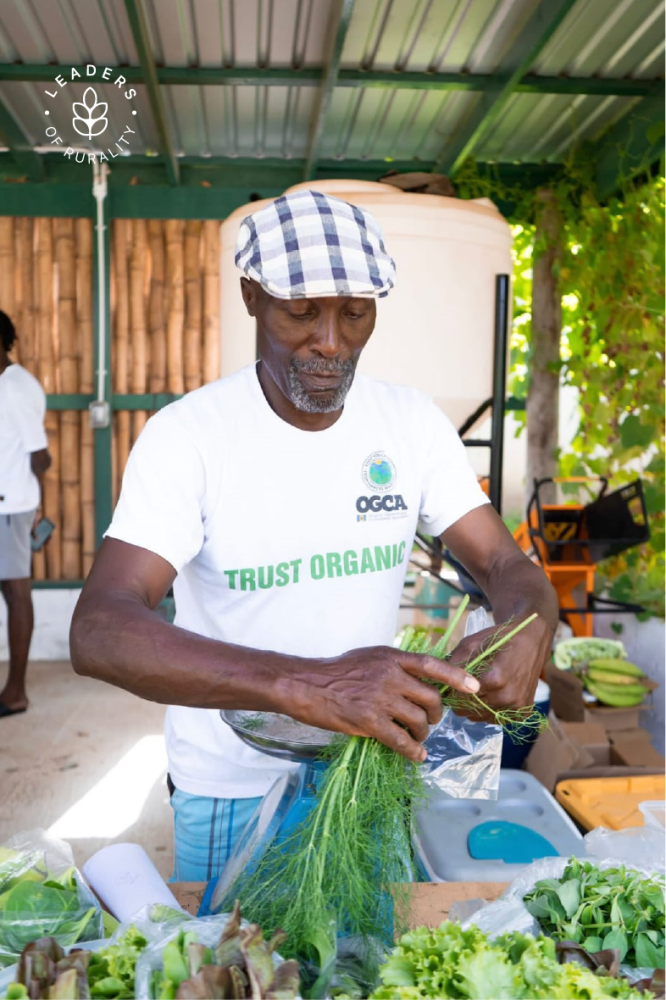John Hunte, a promoter of healthy food production in Barbados for farmers and consumers, is honored by IICA as a "Leader of Rurality of the Americas."

Bridgetown, Barbados, 20 June 2024 (IICA) - John Hunte, who has been promoting generational succession in agriculture and organic farming in Barbados for over 20 years with the aim of producing healthy foods locally and thereby reduce the dependence on imports of Caribbean countries, was recognized as one of the "Leaders of Rurality" of the Americas by the Inter-American Institute for Cooperation on Agriculture (IICA).
Hunte will receive the “Soul of Rurality” award, part of an initiative by the specialized agricultural and rural development organization to recognize men and women who make a difference in rural areas of the Americas, essential for food and nutritional security and the environmental sustainability of the planet.
Hunte was born in London and is the fifth child of a Barbadian couple who emigrated to Britain in the 1950s in search of better opportunities.
In 1984, at the age of 24, John decided to move to his parents' homeland in search of a healthier life closer to nature. There, he had his first contact with food production, working with an uncle who raised chickens.
"I had visited Barbados when I was 11 years old for a six-week vacation and noticed that most people ate very unhealthy food. Therefore, after living in the Caribbean for a few years, I teamed up with others interested in making a change and started promoting organic agriculture, with significant support from IICA, which helped us organize and provided us with training. I then decided not to leave, and I do not regret it," he said.
Hunte was one of the founders of the Organic Growers and Consumers Association (OGCA), established in 1998 to promote the production of food certified for being free of chemicals such as fertilizers, pesticides, and herbicides. Its goal is to contribute to food security in Barbados.
"Our main aspiration is to convince people in the Caribbean, especially young people, that agriculture is a viable way of life. Like my parents, many young people emigrated from Barbados in the 1950s and 60s in search of a better life, leaving a generational gap. The young people who stayed refused to engage in agriculture because they considered it too laborious and unrewarding. Today, slowly, this is changing," he explained.

The award was created to highlight the work of those who play an irreplaceable dual role: being guarantors of food and nutritional security while also safeguarding the planet's biodiversity through production under different circumstances. It also aims to highlight the capacity to promote positive examples for the region's rural areas.
A way of life
Hunte was an avid athlete and outdoor enthusiast while living in Britain. He moved to Barbados in search of a lifestyle change, and although he didn't know much about agriculture, he thought it was an activity he might enjoy.
He quickly realized his choice was the right one. "When we started the Association in 1998, IICA helped us immensely. They also helped in 2001 when we created a cooperative that enabled us to access international cooperation funds and train many young people," he recalled.
In 2001, Hunte met the then heir to the British throne, Prince Charles (now King Charles III of the United Kingdom), a keen advocate of the benefits of organic farming.

"I personally spoke with then-Prince Charles and told him what we were doing. Two weeks later, he sent us a letter saying he wanted to know more about our movement. I sent more information, and six months later, I received a ticket to travel to London and participate in an international conference convened by him He was very committed to the goal of including Caribbean organic vegetables in UK supermarkets," he recounts.
Hunte is convinced that organic agriculture should expand more in the Caribbean, as it represents an opportunity for the region not only to produce and protect the environment and generate economic development but also to produce healthy food so countries are less dependent on imports. This is a priority for Caribbean governments.
"I understand that the main challenge is cultural. We need to change people's mindset in a region whose agriculture has been dominated for many years by monocultures of bananas or sugarcane, with a heavy use of agrochemicals," he affirmed.
"The main income generator in Barbados," he added, "is tourism, just like in other Caribbean countries. Tourists love our beaches. We receive one million visitors each year, more than our population. We have to feed them, and a large part of our food imports are for tourists, not locals. The problem is that we do not import healthy food, resulting in high rates of obesity and non-communicable diseases like diabetes and hypertension among our people. I am confident that this can change if we produce more food. We can do it, and the positive aspect of the Covid-19 pandemic and the increased food prices due to the war in Ukraine is that it demonstrated to society that farmers are essential."
Today, the priority for Hunte and the organic farmers of Barbados is to convince young people that producing food is not only necessary for the country and for people's well-being but also viable as a life project.
"Still," he concludes, "the average age of farmers in Barbados is between 50 and 60 years. But with our work, we have already attracted many young people and will continue on the same path."
More information:
Institutional Communication Division.
comunicacion.institucional@iica.int
Photo Gallery